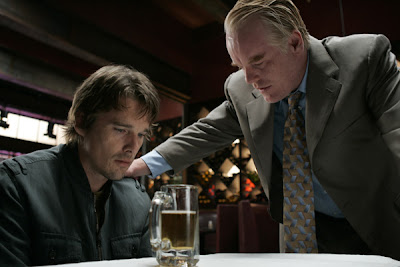 You'll never live like common people
You'll never live like common peopleTomorrow is the Pennsylvania primary, a contest that Hillary Clinton will probably win by between 5% and 10% of the vote: sufficient to justify her continued presence in the race, but nowhere near enough to erase Obama's lead in pledged delegates. Seven weeks have elapsed since the Texas and Ohio primaries (how many of us even remember those supposedly decisive contests?), and during the interlude the Democratic race has devolved into a cartoonish mire of negativity and incivility. The chief effect has been that Senator Obama, once perceived as a "post-racial" font of positivity that would vex the Republican attack machine and outshine the superannuated John McCain in November, has been forced to outpace his gaffes and some unfortunate prior associations - first with his pastor, Reverend Jeremiah Wright, and now with Bill Ayers, an unrepentant domestic terrorist with whom Obama has, at the very least, and probably the very most, crossed paths. Meanwhile, Senator Clinton, in attempting to exploit these supposed chinks in Obama's armor, has merely reinforced the prevailing perception that she is ruthless, mercenary, and disingenuous; charges that are by the day becoming more difficult to refute. Americans, to their credit, seem disinclined to reward this distasteful opportunism, as neither candidate's poll numbers have recently budged.
The ringamorale of the past month and a half has reinforced my belief that the electoral process, though it may never have been about ideas, per se (it's not you/it's the nostalgia talking), has now become nothing short of an obstacle course, designed not to allow voters to make the best possible choice, but to see who can play the game best. Of course, no one can win: the omnipresent media-eye withers whichever candidate is unfortunate enough to endure its focus longest. Now it is Barack's turn, as it has been Hillary's, and will be John McCain's, and back and forth again. Some of this scrutiny is useful: I would even argue that the minor controversy over Obama's recent statements ("bitter", "clinging") is at least illuminating, insofar as how the candidate interprets the electorate. Much of it, however, is trash: Hillary crying in a diner, the sporadic appearances of Obama's flag lapel pin, McCain's flat "bomb bomb bomb, bomb bomb Iran" joke. The utility of this information seems to be that it keeps the 24 hour news industry knee deep in grist for the mill between updates on Natalie Holloway's whereabouts and Britney Spears' latest hospitalization.
This year's primaries are particularly perverse inversion of the formula: even as the internet and television have colluded to provide saturation coverage, the primary season has improbably trudged into the spring, meaning that the 2008 presidential campaign has been afoot at least since John Edwards announced in December
2006, an inconceivable
sixteen months and counting. Worse yet, most states, fearing the exclusion of their voters in the primary process, front-loaded their contests, sticking us with a lonely archipelago of laggards: as of today, 44 primaries have already occurred, with merely 10, including Pennsylvania, yet to happen between now and June 3. Yet the carpet-bombing nature of 24 hour news cycle has obviated the intent of a leisurely primary season, wherein presidential politics were more human-scale and a candidate's words did not ring instantaneously across hundreds of cable stations and millions of web sites, followed by secondary and tertiary waves of analysis and critique. Back then, perhaps, it was important that Jack Kennedy and Hubert Humphrey take their respective cases directly to Wisconsin's dairy farmers; today if Barack Obama mutters something in his sleep, no doubt CNN will rustle up a polysomnographer to chat for a few moments via satellite with Wolf Blitzer. The only people who don't know are the ones not paying attention, and I'm not sure how giving them another seven or eight weeks of this dreck, as opposed to, say, a consolidated month or two of regional primaries, legitimizes the current process.
What we have now is an endurance test that exists to no one's apparent benefit except the vast army of commentators, analysts, and satirists that thrive on the chaff and choke on the wheat - i.e. where the candidates stand on Iraq, the economy, health care, renewable energy, or their responses to any of the other myriad crises presently wracking our democracy. I won't delude myself by suggesting that the latter was ever wholly front and center: packaging has always had an advantage over content in our politics, dating back to George Washington's calculated decision to wear his military uniform as a civilian delegate to the Continental Congress. Nor would I suggest that negativity is endemic only to our own era; anyone who's taken the time to tune in to HBO's
John Adams mini-series knows that even such august personages as Thomas Jefferson and Alexander Hamilton were not above taking liberties with the facts in order to sully the reputation of a rival. Yet our present predicament has all but crowded out the policy in politics in favor of the mechanical aspect, turning what should be a contest of ideas and values into a cynical spectacle wherein only snarky skeptics are rewarded for their raging contempt. What remains is a Rube Goldberg contraption better suited to choosing the next American Idol than the next American president.
Next stop, Guam.

























